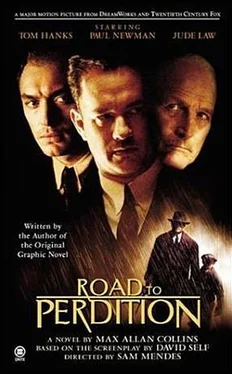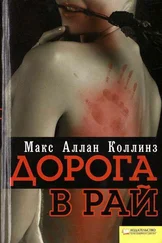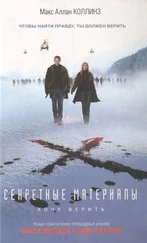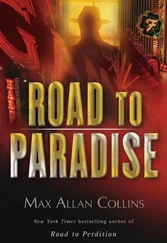The boy thought about that. “Shoot?”
“Yes.”
The boy thought about that, too. “Where do I aim? The Lone Ranger shoots the guns out of people’s hands.”
“The Lone Ranger isn’t real. Shoot at their heads.”
Michael swallowed. “Couldn’t I just shoot at their legs?”
“No. Their heads, if they’re close enough. Or their chests, if you need a bigger target.”
“Oh, Papa... I’m afraid.”
“That’s not a bad thing, son. God put that feeling inside of us so we would protect ourselves. So we can survive.”
Michael’s head was swimming, O’Sullivan could tell; but his son needed to hear these things.
Then the boy asked, “But what about thou shalt not kill, Papa?”
The beleaguered father had known this would come up again, and he was ready: “God gives His permission for us to protect ourselves from evil men.”
Michael thought about that. “What if a policeman comes?”
“Run.”
“Papa... run from a policeman?”
“There are no police in Chicago, son. Just killers in blue uniforms... If I’m not back in an hour and a half, you find the nearest church.”
“A Catholic church, Papa?”
“No... God, no. Protestant, Michael. Please.”
“How will I find it?”
One of the librarians, a slender woman in her thirties, had been watching this whispered conversation — hearing none of it; her expression was warmly appreciative of the close bond between the boy and his father. She would have found the scene less heartwarming, had she overheard it.
O’Sullivan said, “Ask that nice librarian. Get directions.”
Michael seemed close to tears, despite his efforts at stoicism.
Touching his son’s shoulder, O’Sullivan said, “You’ve done well.”
The boy liked hearing that.
His father continued: “I probably won’t be gone that long. And I will be back... But you saw what Connor Looney did last night — you know what we’re up against. We have to be strong — we have to consider the possibilities.”
The boy was nodding. “Backup plans.”
“That’s a good way to put it.” He patted the boy’s shoulder. “You’ll be fine.”
On his way toward the exit, O’Sullivan noted his reflection in a mirrored wall — he looked pretty rough; unshaven. He ducked into a bathroom and threw water on his face, ran his hands through his hair, doing his best to spruce up.
With his father gone, Michael got into his little suitcase; there, among some clothes, were his pipe, his dice, and two Big Little Books, a Tom Mix and the Lone Ranger one that he was still reading. Selecting that one, the boy sat and thumbed it open. His eyes looked at the full-page picture at right, of the Lone Ranger holding a gun on a sheriff. The caption, redundantly, said: “The Lone Ranger had the Sheriff covered.”
Five minutes later, in the vast room, surrounded by big-city strangers, the boy was still staring at the same page.
Then, his face blank, he shut the book, pushed it aside; he felt his lower lip begin to quiver and his eyes began to get wet, his whole face quivering, as if he had no control over it, which he didn’t.
The boy put his head on the table, the way the nuns at the Villa had the students rest at their desks, and he wept, trying to stay quiet, and not attract attention, because his father wouldn’t have liked that.
At 22nd Street and South Michigan Avenue, the Lexington had once been one of Chicago’s most elite hotels, and the ten-floor structure still made an impressive appearance, with its turreted corners and bay windows. O’Sullivan had been here before — also at the former mob headquarters, the Metropole Hotel, just a block away. The Capone organization had the run of the place, controlling the third, fourth, and tenth floors and scattered rooms throughout, many of the latter taken up by the numerous hookers and showgirls Capone kept salted away for the convenience of himself and his boys.
Standing across the street, eyes on the marble pillars framing the entrance, O’Sullivan knew full well he was entering a mob stronghold. Capone had put in alarms, moving walls, hidden panels, and Christ knew how many other security measures. Though the hotel looked normal enough — doormen and bellboys thronged the glass doorways — the lobby would be crawling with Outfit gunmen. Nonetheless, as an expression of good faith, he was unarmed, the .45 and his other weapons left behind in the parked Ford. All O’Sullivan had on his side was the unexpected boldness of what he was about to do — that, and his reputation.
Moments later, O’Sullivan was walking across the magnificent lobby, across the black-and-white checkered tile floor, toward the iron-grille elevators. One of those elevators — which no one seemed to be using — stood vacant, while on either side of it, two watchdogs in Maxwell Street suits stood guard.
The brawnier of the two leaned against a wall, reading The Racing News . The other one — taller, skinnier — was smoking a cigarette, rocking on his feet, eyeing the floozies who were a part of the odd Lexington mix that included a surprising share of legitimate guests — salesmen and other professional types, in Chicago on business.
O’Sullivan approached, saying to the brawny watchdog, “How are you, Harry?”
Harry looked up from his racing paper, obviously startled to see this unshaven figure. “Mike!... Mike O’Sullivan. Yeah, uh... hello.”
O’Sullivan looked at the taller watchdog. “Marco, isn’t it?”
Marco nodded, warily.
Harry said, “Hey, uh, Mike — heard about what happened. Christ, it’s awful. How you holdin’ up, pal?”
O’Sullivan said, “I need to talk to Mr. Capone.”
Marco, who didn’t seem to know what Harry was talking about, said, “Mr. Capone is out of town.”
“Mr. Nitti, then.”
Marco shrugged. “You ain’t on my list.”
O’Sullivan smiled. “Like to be on mine?”
The watchdog paled. “I don’t mean any offense, Mr. O’Sullivan. I just got a job to do.”
Harry said, “Mike, Mr. Nitti’s awful busy today.”
“I’ll wait.”
The two watchdogs exchanged glances; both of them knew only too well who and what Mike O’Sullivan was.
Harry shrugged. “Okay — Marc, take the man to the top.”
Marco stepped inside the elevator and so did O’Sullivan.
“Meaning no disrespect, Mr. O’Sullivan,” Marco said, “you’re gonna have to stand for a frisk.”
“Fine. But I’m not packing.”
Marco patted O’Sullivan down, found nothing, and said, “Friendly visit.”
“Always.”
Marco swung shut the grille-work doors. Ten floors took a while, and they rode in silence at first, then the watchdog asked, “How’d you remember my name? You only saw me, once. We never even spoke.”
“I make it point to remember men’s names.”
“Yeah?”
“Men with guns.”
Marco thought about that, then asked, “What was Harry talkin’ about? What’d he mean, how are you holding up, you don’t mind my asking?”
“I do mind,” O’Sullivan said.
The elevator continued on its slightly jostling course, making no stops along the way.
“Quite a reputation you got,” Marco said, perhaps starting to resent O’Sullivan’s understated lack of respect.
“I don’t know how that happened,” O’Sullivan said.
“How do you mean?”
“I don’t remember leaving anybody to spread the word.”
And then they were there, at the top floor waiting room, where politicians and businessmen of varying degrees of respectability mingled with shadier-looking figures. Cigarette smoke floated like a blue haze as the men sat and chatted, talking business and sports and even family, drinking the coffee provided thoughtfully by the Capone organization.
Читать дальше












